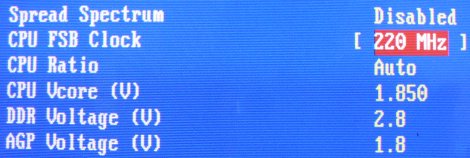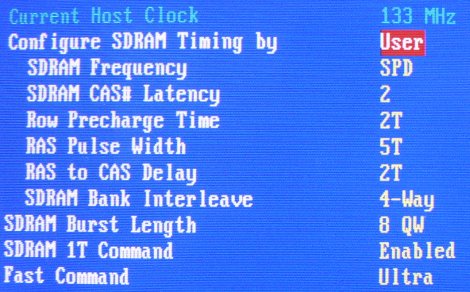BIOS and overclocking
Bios duty is handled by AMI, version 3.31 being the particular variant that ships with the KT3. We're fans of AMI BIOS' here at Hexus and was glad to see it make an appearance on the KT3.The usual gamut of hardware features are covered in intuitive fashion. MSI has historically been rather conservative in their performance manipulation options, something that appears to have changed somewhat of late.

The above shows the main configuration screen. I've chosen to show the maximum figures on offer. CPU FSB can be adjusted from 100MHz to 220MHz in one MHz increments. The slightly annoying thing is that you cannot manually input a desired FSB, you have to cycle through them all in 1MHz increments. This seems to be peculiar to MSI BIOS'.
CPU Vcore can be raised from the standard 1.75v to 1.85v in 0.025v increments, about the norm for today's 'boards. DDR voltage is catered for with settings of 2.5 - 2.8v selectable in 0.1v increments. Lastly, shaky AGP cards can be steadied with a little extra voltage. 1.5, 1.6, 1.7 and 1.8v is on offer here. I'm relatively pleased with the amount of manipulation on offer.

The main DDR manipulation screen is reasonably comprehensive, too. You are given the option of running the memory at 200MHz DDR, 266MHz and 333MHz DDR. As I was using a module of Samsung PC2700 memory, I simply set it to SPD. I consider the timings shown above to be the most performance-enhancing on offer, so those were used for benchmarking purposes. Note the 1T SDRAM command is available if your memory can take it. The usual power, health, boot and peripheral options are present within BIOS.
Even with these strict timings, I did not encounter any stability issues at all. That's quite pleasing from a reviewer's standpoint.
Overclocking, with Athlon XP processors, is something that is a hit-and-miss affair. Your overclock is more reliant on finding a decent processor than the motherboard you use. Using a standard, locked XP2100, I managed to gain decent stability at 142FSB or 1846MHz. Your overclocking mileage may vary considerably, usually limited by the processor if left factory unlocked.









